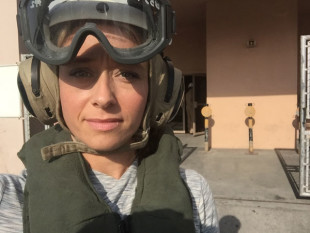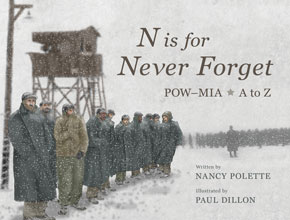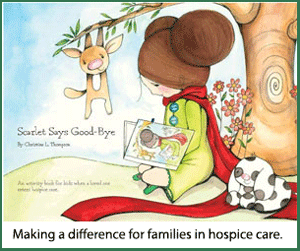All of me. Why not take all of me?
A young singer in uniform poses the musical question, backed by a jazz ensemble of fellow soldiers. The bass player nods in comprehension as the strings of his instrument and the singer’s query resonate across the room.
Your goodbyes left me with eyes that cry. How can I go on without you?
The room is full of military couples, people who have said their share of goodbyes. On this night, however, they’re together enjoying a nice meal and a night out, sponsored by the chapel at Fort Stewart, Georgia. Gathered at tables for six or eight, the couples swap stories about their assignments over the world, from Fort Bragg, North Carolina, to Ramstein in southern Germany.
When the band finishes its set, Corie and Matt Weathers take the stage, but not to entertain. They’ve come to talk about the stress military service places on marriage.
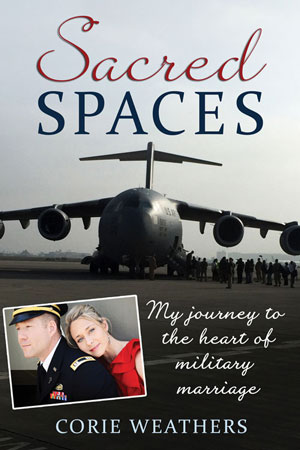
When then-US Secretary of Defense Ash Carter invited Corie, as 2015 AFI Military Spouse of the Year, to join his team on a one-week overseas trip, she eagerly accepted, hoping to gain a better understanding of her husband’s deployment experience and lessen the impact sacred spaces had on her marriage. She wrote about her journey in her book, Sacred Spaces.
Corie is a licensed professional counselor. Matt is a US Army chaplain. Married for 17 years and veterans of multiple deployments, the couple has lived the message Corie wrote about in her book, Sacred Spaces: My Journey to the Heart of Military Marriage.
“We often miss large chunks of life while we are apart during deployment,” Corie tells the Fort Stewart crowd. “That may include intense, life-changing experiences. These unshared experiences, whether positive or negative, have consequences. In our marriage, Matt and I call these ‘sacred spaces.’”
As she and Matt share their experiences throughout the evening, there are nods of understanding, bursts of laughter, and moments of quiet contemplation.
The Weathers have combined their professional and personal expertise in ministry for several years, encouraging couples to care for the health of their marriages through chapel programs and marriage retreats.
After Corie was named the Armed Forces Insurance Military Spouse of the Year in 2015, she was invited to join then Secretary of Defense Ashton Carter, on a trip to strategic military locations, including Iraq, Afghanistan, Turkey, and the Persian Gulf, to report from a spouse’s point of view. On that journey, she also discovered unexpected truths about herself and her marriage, especially when visiting Afghanistan, where her husband served with a unit that experienced several combat losses. Corie realized she was harboring resentment about the ways she and Matt had been changed by deployment and the space those changes created in their marriage.
Corie wanted to write Sacred Spaces because she believed her experience could speak to other couples.
It turns out she was right, and not just in the military community. Her message of recognizing and respecting sacred spaces has resonated with couples connected to first-responder careers as well. In September 2016, the Chris Kyle FROG Foundation invited Corie to be a speaker and facilitator for an Empowered Spouses Retreat in Wyoming. Spouses of military and first responders were invited to the pilot program.
“Both are intense communities with intense experiences,” Corie says. “When we put the two groups of spouses together, we realized that both understand each other and have such sympathy for each other.”
For military couples, intense experiences that create sacred spaces often occur during deployment, when couples are apart for extended periods. For first-responder couples, events that may become sacred spaces are interspersed in day-to-day life.
Angela Horton, wife of a law enforcement officer in Colorado, explains how she and her husband, Craig, experience those events differently.
“It could be middle-of-the-night call outs where my husband is responding to a SWAT call with an armed subject, or a serial rapist, while I am home alone with two small children,” Angela says. “Sometimes I can’t sleep because of fear. The officer’s experience is one of duty, training, and action at that point in time. Mine is one of worry, fear, a racing mind, full of ‘Is he okay?’ ‘Is he going to make it home for our date tomorrow?’ or ‘What and how much do I tell our kids?’”
After reading Sacred Spaces, Angela attended the Empowered Spouses Retreat. Through first reading the book, then hearing from Corie in person at the retreat, Angela gained a more optimistic perspective of her marriage.
“We face incredibly challenging issues, different, say, from the marriages of your neighbors that are engineers, businessmen,” Angela says. “Our stressors are drastically different than those of other marriages, but they also define who we are as a team, if we keep our minds focused on being a team rather than adversaries or competitors.”
Kelli Vincent, whose husband Terrell is an army veteran and now a highway patrolman, attended the retreat as well. She received a copy of Sacred Spaces and read it all on the plane going back home to Louisiana.
“I couldn’t wait to hear more about what Corie had to say,” Kelli says, “then I couldn’t wait to come home and tell Terrell.”
At first, the term “sacred space” didn’t make sense to Terrell at all.
“I thought it was church or something,” he says.
After he and Kelli talked more, they realized the concept of sacred space could help Kelli better understand the triggers that caused him to relive events surrounding the day his brother, also a law enforcement officer, was killed in the line of duty.
“Before that, I don’t think Kelli understood what was going on,” Terrell agrees. “She was like, ‘it’s been a year you gotta get over that.’ … Now she has a better understanding of that. (A trigger) takes you right back—maybe not to that same moment. Time heals the wounds, but it still hurts.”
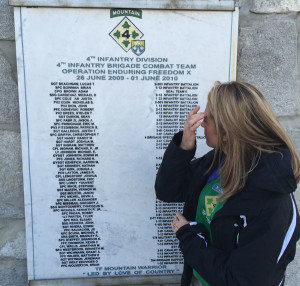
Among Corie’s experiences on her journey overseas, she visited a memorial at FOB Fenty, where several of Matt’s fellow soldiers died in battle. Matt’s experience as a chaplain during that deployment and Corie’s experience on the care team serving grieving widows back home, constitute one of the many significant sacred spaces in their marriage.
Corie explains that sacred spaces can form around any significant event—positive or negative—that a couple experiences separately. Kelli recognized that the day Terrell’s brother died was a sacred space for Terrell. Even though she was nearby, he experienced it differently than she did. That knowledge gives her a frame of reference to be more supportive to her husband.
“It’s helped me to be more intentional and understanding his sacred spaces and trying to create more sacred spaces we can share together, rather than he alone and me alone.”
Angela says since she read Sacred Spaces, she and Craig are learning to communicate more effectively about difficult duty calls and how they each are affected by them.
“We are trying to gain a better understanding of how the other is affected by these experiences and how to respect, honor, support one another even though our perspectives are so different,” she says. “We give one another permission to see a critical situation and its effects differently than our spouse and not feel like we need to defend or justify it … to say, ‘You may not understand why I feel this way, but I need you to respect it.’”
Corie travels and speaks to many groups about sacred spaces, loving intentionally, and letting go of resentment. This month she speaks to several Air Force audiences at Misawa Air Base, Japan, as her book takes the message to even more locations around the world.
Lindsay Swoboda, a Marine Corps wife, said she felt “lost” when her husband returned from his fifth deployment.
“I didn’t know how to put our pieces back together,” says Lindsay, who blogs at UpliftingAnchor.com. Looking for resources, she typed “military spouse podcast” into Google and found Corie’s LifeGiver podcast. Lindsay says giving words to her experience has been “life-changing,” opening up healing and sometimes difficult conversations with her husband.
“The book made us talk again,” she says. “We’ve been given the chance with the term ‘sacred spaces’ to step back and understand there is much about our time apart that cannot be explained or fully understood. We cannot walk in one another’s shoes. I have never been deployed and faced a war zone. He has not carried the diaper bag and been awake for months alone with a newborn. But we can seek to love, communicate, and grant graciousness to one another.”
Dina Dziolek, a mental health professional, and her husband, David, an Air Force chaplain, are using Corie’s book as the basis for discussion in a group of military couples at Kirtland AFB, New Mexico. Dinah said she has also seen avenues of communication opened by Corie’s book.
“I have seen service members (in our group) share things they never talked about before regarding their deployment experience and have seen couples grow closer through sharing their experiences and fears openly in class,” says Dinah. “I love to use books written by military spouses and families. I often remind the class this couple is a couple just like them with real struggles and have discovered real intimacy. This is the beauty of being transparent with people. We can find healing together.”
Angela was also moved by the honesty and vulnerability of Corie’s book.
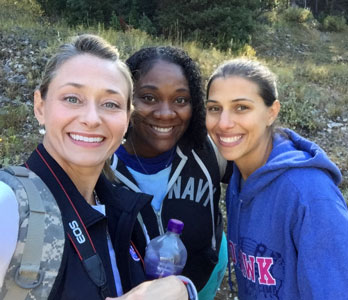
Corie with first-responder spouses, Tamar Harper and Joanna Ruskin-Willis, on a hike in Jackson Hole, Wyoming, part of the Chris Kyle FROG Foundation Empowered Spouses retreat.
“Corie doesn’t hold back or gloss over the struggles, frustrations, and deep pain our marriages go through as a result of service,” Angela says. “She shares from her heart, acknowledging that she doesn’t always have the answers, but that she is committed to learning her husband and herself better and not letting them become yet another statistic.”
Readers write to Corie to say they identify with her feelings. Discovering hidden resentments is one of the greatest common denominators.
“They are relieved to know they are not alone,” Corie says. “Resentment sounds so ugly. We want to hide it, but I hear from people who say they didn’t know how much resentment they had until they saw the words in my book. My goal was to give them a way to move forward on that, versus getting stuck in it.”
In the book, Corie describes the moment when she let go of her resentment while flying over the mountains of Afghanistan, where her husband endured some of his most life-changing experiences.
“You don’t have to be flying over Afghanistan to leave your resentment somewhere,” she says. “When you’re ready, you can do something formal to release it wherever you are. At the retreat in Wyoming, we had this beautiful river, and we could go down to the river and release it, let it go. That doesn’t mean it’s never going to creep up on you, but at least you have a marker to look back on and say, ‘No, I released it.’”
Corie says writing Sacred Spaces felt like a risk to her, because of the principles she lays out in its pages, advising readers to look to their mates first for whom to serve, and to look at themselves first for whom to change.
“It’s a big ask. I’m asking people who are already weary not to give up, to do even more for their marriages. I was expecting a backlash: ‘Who does she think she is?’ or ‘I’m tired,’ but I’ve actually gotten the opposite reaction. When they let that resentment go, they realize they do have something left to give their marriage. They didn’t realize what it was that was holding them back.”
Lindsay found Corie’s call to action a positive push in the right direction.
“It reignited a flame within me to pursue my spouse’s heart,” she says. “It is very easy to slip into being bitter in this lifestyle. It is very easy to feel always last to the greater good of the military career. It’s easy to get exhausted and become unloving.”
Lisa Colello’s husband was injured in a 2003 battle that cost the lives of many in his Marine Corps platoon. After reading Sacred Spaces, Lisa said her eyes were opened to the resentment she harbored because of the changes in her husband and to her life.
“I wanted him to acknowledge just how much I had lost to the military as well,” Lisa says. “I thought I was praying for my husband to be better, but really I was praying for my own selfish needs. He doesn’t need me to pray for him to be fixed. He needs me to pray for strength and understanding to endure our trials. He needs me to show love and acceptance first, because he is the one who feels defeated and scared of who he has become. I left my resentment on the pages of that book. I don’t want to live like that anymore.”
If the objective is unconditional love, says Kelli Vincent, the price is sacrifice and hard work—work she is willing to do.
“You don’t get that kind of undying love in a day. You don’t get that in two years, or thirteen years,” she says. “You get that through your difficulties and working through all of that together. That is how you build that love. No matter what, I’m here. We’re gonna get through this. Knowing it doesn’t happen overnight. It takes time. It gives us hope.”
Such resolve from her readers fuels Corie’s determination to live out the principles in her book, putting herself aside for her husband but not sacrificing their marriage to the work they do.
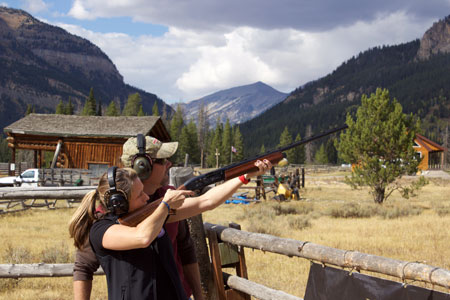
Participants at the Empowered Spouses retreat, sponsored by the Chris Kyle FROG Foundation, tried their hand at skeet shooting. Here, Corie takes a shot at the moving target, a clay disk propelled into the air.
“If I’m going to ask other people to commit to each other, then I don’t have an excuse either to get tired,” she says. “Matt and I are just one more couple in a helping profession. There’s a lot of pouring out and sacrifice involved. That’s what first-responder couples do too. We all have problems knowing when to take care of ourselves before we take care of everyone else. I see marriages sacrificing themselves to take care of others. We are no different.”
Sacred Spaces is making a difference to many of its readers, but the first person to be changed by the book was the author.
“Writing this book rewrote my understanding of love,” Corie says. “I saw myself from an authentic perspective, not just how I want to spin it on Facebook. I realized my capacity to make mistakes, to disappoint Matt and hurt him. In the past, I loved Matt, but I think I saw his potential and loved who I thought he could become. I realized that is a lot of pressure to put on somebody. A much better understanding of love is to say I love you for who you are right now, even in your worst moments and I understand who you are with everything that’s happened in your life, including your sacred spaces. That makes you who you are. I can appreciate and love who you are and not need you to be anything different than you are right now.”
Marriage, in Corie’s book and in her heart, requires total commitment to love her husband, sacred spaces and all.
You took the part that once was my heart, so why not take all of me?
Web: CorieWeathers.com
Facebook: /CorieWeathersLPC
Twitter: @CorieLpc
More about Sacred Spaces: My Journey to the Heart of Military Marriage by Corie Weathers
Buy the book from MilitaryFamilyBooks.com or Amazon.com or your favorite bookstore.
Sacred Spaces is a finalist in the ForeWord INDIEFAB Book of the Year Awards and a finalist in the Midwest Book Awards.
UPDATED September 2017: Congratulations: Sacred Spaces was awarded the Gold Medal for Best Relationships/Marriage Book in the Living Now Book Awards!
Photos courtesy of Corie Weathers.
Terri Barnes is a regular contributor to Books Make a Difference magazine, author of the book Spouse Calls: Messages From a Military Life, and special projects editor at Elva Resa Publishing, a publisher specializing in books for and about military families. Terri’s husband is a retired Air Force chaplain.
This article was first published in May 2017.

